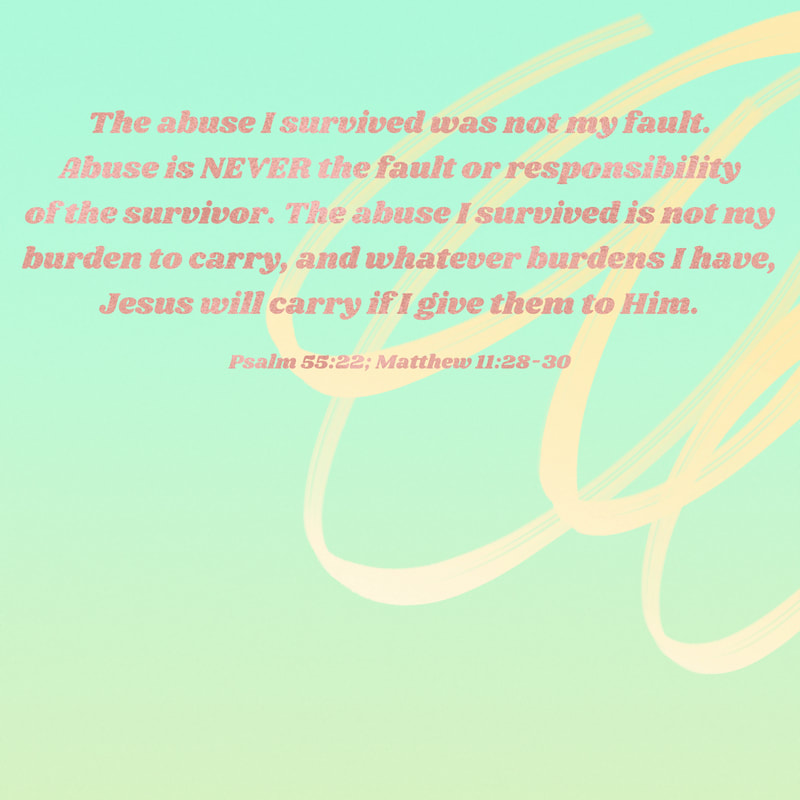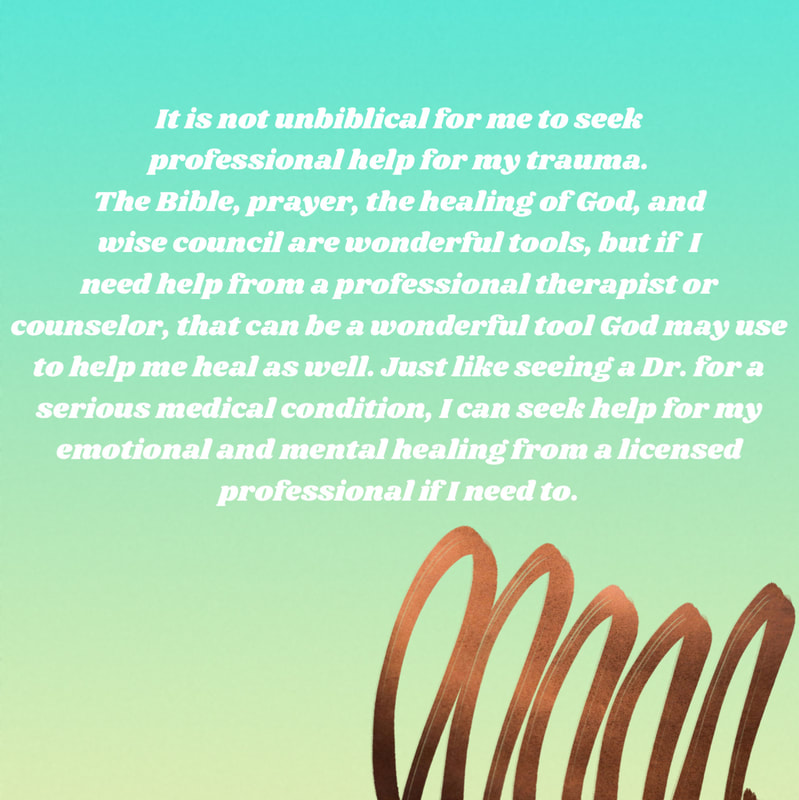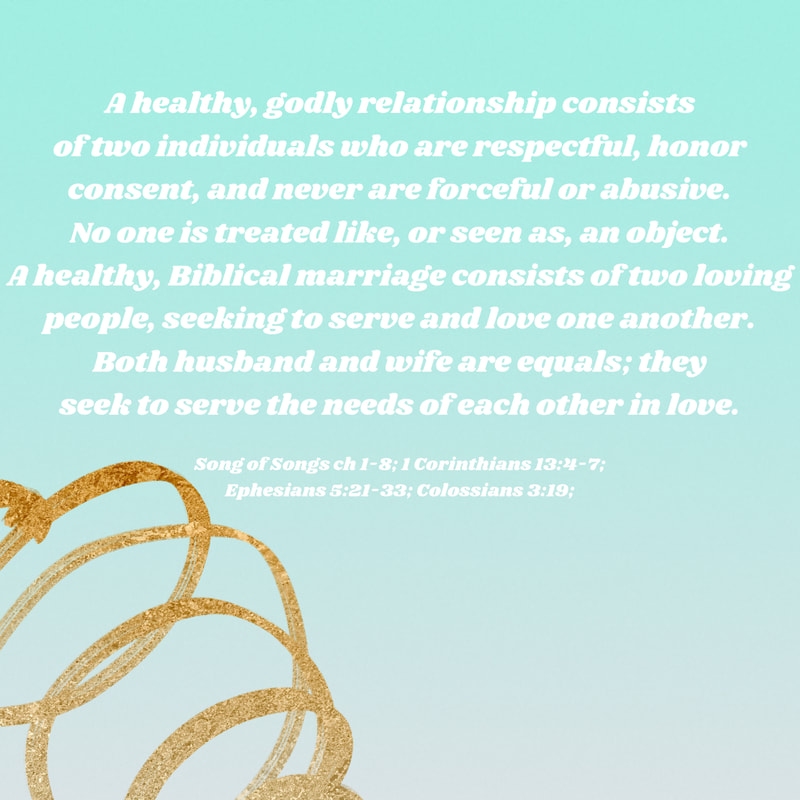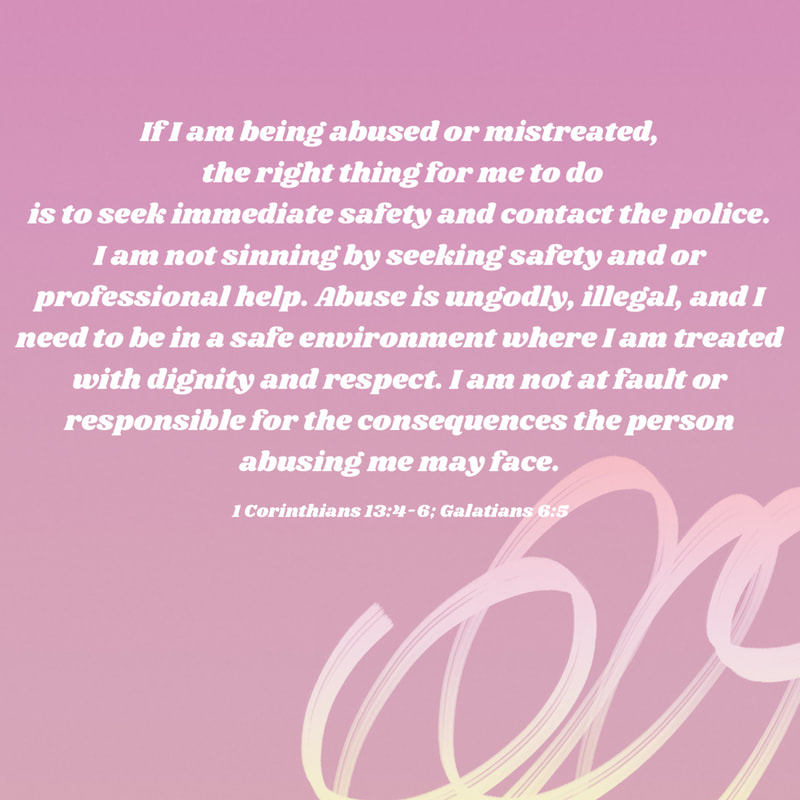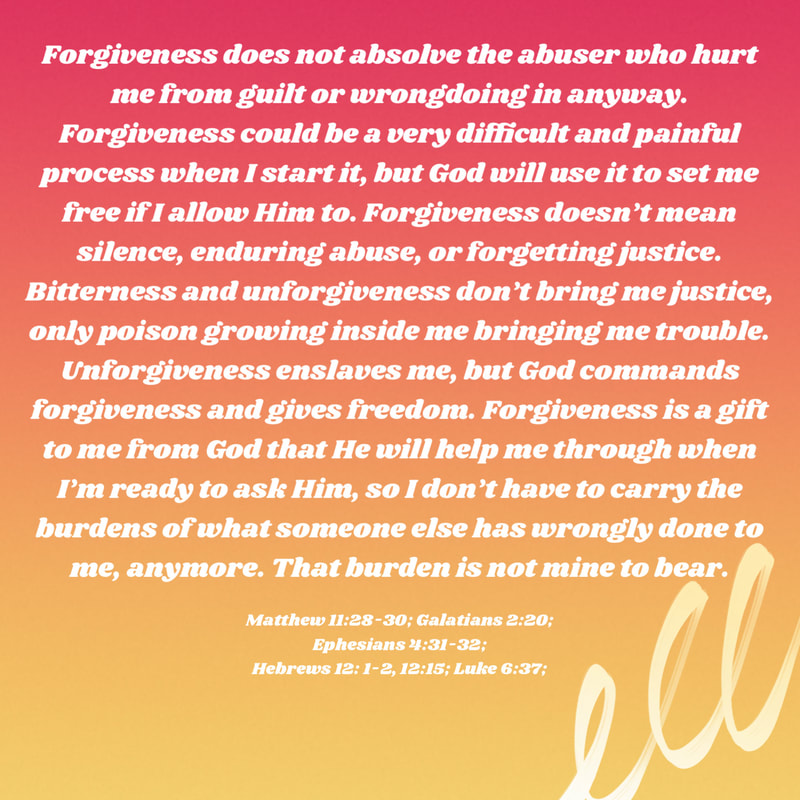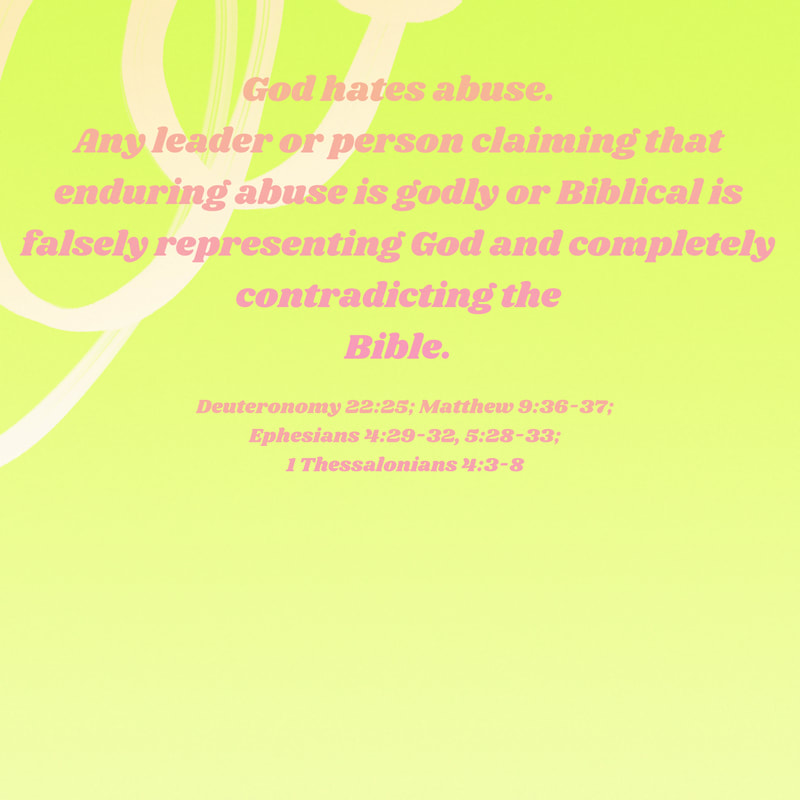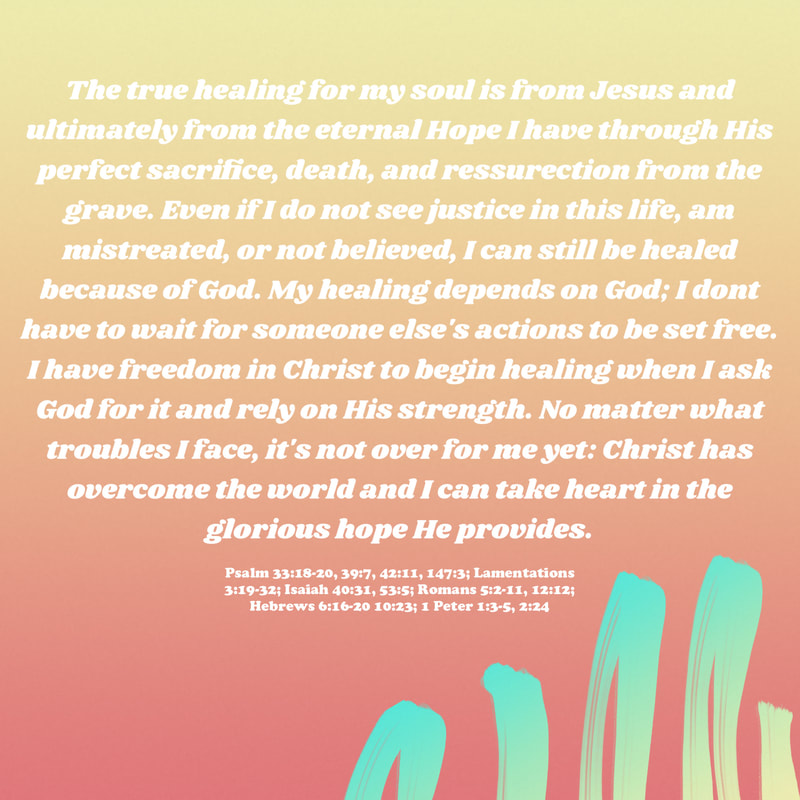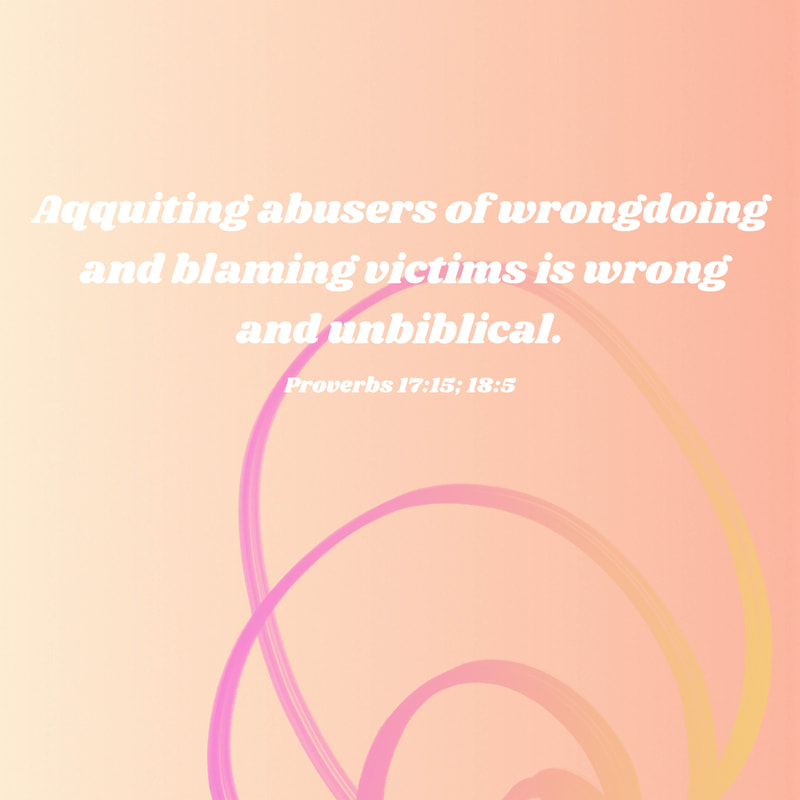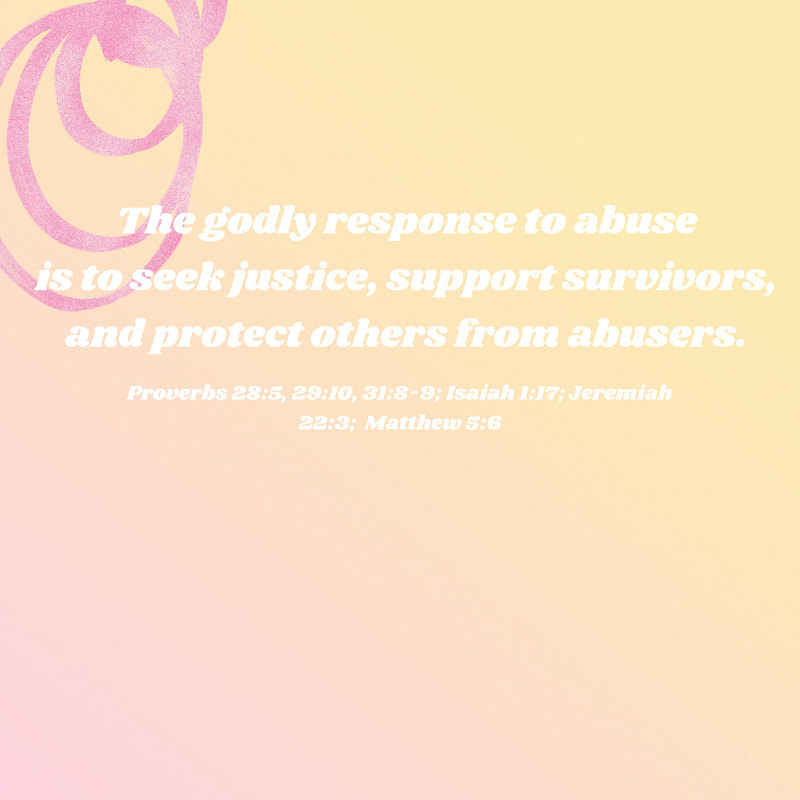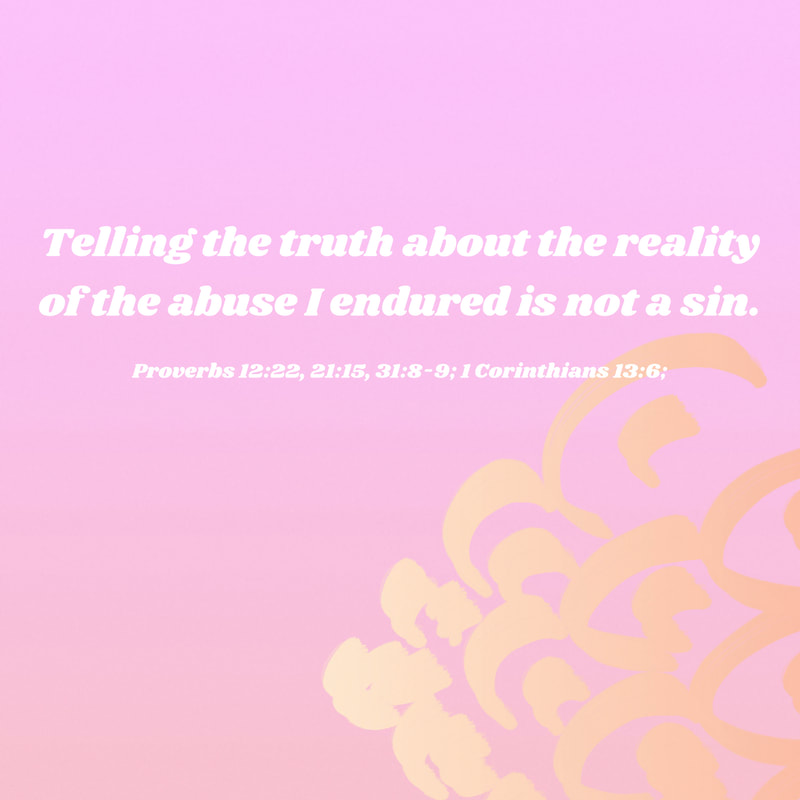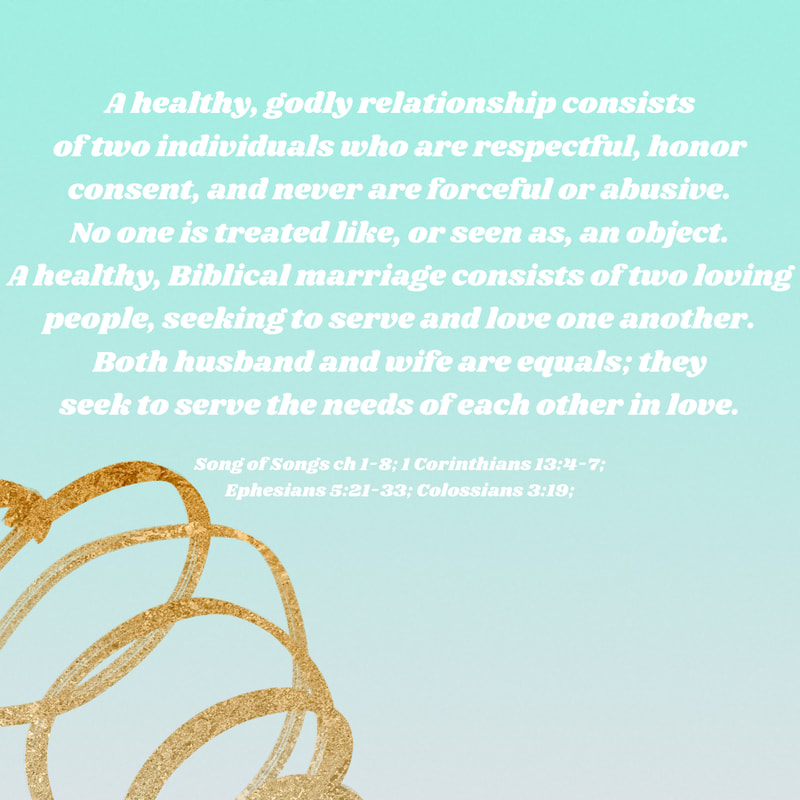survivor encouragement cardsThese cards are meant to be used by survivors who are seeking spiritual/biblical encouragement in their healing journey. Please feel free to share these; we simply ask you site The Real Truth Ministries, and link this post. Plagiarism, adaptation without permission, and making changes to these images is prohibited.
What are my rights as a victim in Utah? According to the Iron County Sheriff's Office Victim Services webpage: The Utah Legislature has passed a number of provisions in a continuing attempt to afford victims the rights they deserve. In 1994 numerous groups and citizens rallied together to support and pass a Victims’ Rights Amendment to the state constitution. These efforts have culminated in working toward the end result we all are striving to reach, "balancing the scales of justice." A summary of those rights are as follows:
resources:
|
||||||||||||||||||||||||||||||||||||||||||||||||
| Multi-Color Consent Chart | |
| File Size: | 120 kb |
| File Type: | |
| Pink Consent Chart | |
| File Size: | 120 kb |
| File Type: | |
| Jungle Flower Consent Chart | |
| File Size: | 200 kb |
| File Type: | |
Ministering to Victims of Sexual Abuse
If you a ministering to a victim of abuse and the victim is a child (under the age of 18), you are legally required to report the sexual abuse to the police immediately. It does not matter if parents or others prefer otherwise: you are legally required under penalty of law to report.
If you a ministering to a victim of abuse and the victim is a child (under the age of 18), you are legally required to report the sexual abuse to the police immediately. It does not matter if parents or others prefer otherwise: you are legally required under penalty of law to report.
- Validate them
- Reiterate that abuse is never the victim’s fault, EVER
- Tell them you believe them
- Explain that you intend to support them
- Tell them they are brave for sharing the truth
- Say things like, “I am so sorry that happened to you” and avoid making negative faces, noises, or jokes.
- Avoid phrases and words like “aww”, “bless your heart”, “you poor thing” etc. and instead say things like, “thank you for sharing”
- Reiterate that abuse is never the victim’s fault, EVER
- Help them remember that sexual abuse is against God’s word
- Remind the victim that God and His word are against sexual abuse
- Remind them that it hurts God that someone hurt His child
- Remind them that they have value because God created them and that that value cannot ever be changed or taken away from them
- Remind the victim that God and His word are against sexual abuse
- Remind them of God’s character
- God hates abuse
- God is clear about His feelings about sexual assault, and caring for victims, in the Bible
- Deuteronomy 22: 25-27 “But if the man meets the engaged woman out in the country, and he rapes her, then only the man must die. Do nothing to the young woman; she has committed no crime worthy of death. She is as innocent as a murder victim. Since the man raped her out in the country, it must be assumed that she screamed, but there was no one to rescue her.”
- 1 Thessalonians 4:3-6 “It is God’s will that you should be sanctified: that you should avoid sexual immorality; that each of you should learn to control your own body in a way that is holy and honorable, not in passionate lust like the pagans, who do not know God; and that in this matter no one should wrong or take advantage of a brother or sister.”
- Deuteronomy 22: 25-27 “But if the man meets the engaged woman out in the country, and he rapes her, then only the man must die. Do nothing to the young woman; she has committed no crime worthy of death. She is as innocent as a murder victim. Since the man raped her out in the country, it must be assumed that she screamed, but there was no one to rescue her.”
- God is clear about His feelings about sexual assault, and caring for victims, in the Bible
- Jesus cared for the hurting, broken, and mistreated, and He will care for you
- Matthew 25:44-45 “Then they will reply, ‘Lord, when did we ever see you hungry or thirsty or a stranger or naked or sick or in prison, and not help you?’ “And he will answer, ‘I tell you the truth, when you refused to help the least of these my brothers and sisters, you were refusing to help me.’”
- The bleeding woman
- Mark 5:25-34
- Mark 5:25-34
- The demon possessed man
- Mark 5:1-20
- Mark 5:1-20
- The woman at the well
- John 4:1-41
- John 4:1-41
- Jesus ministered to women and His ministry was facilitated by women.
- Mary the mother of James and Joseph, Mary the mother of James and John, Mary the sister Lazarus, Martha, Mary Magdalene, Joanna, Susanna, the women who provided for Jesus with their resources [Luke 8:3], the unnamed female followers of Jesus [mentioned throughout the gospels who followed Jesus and listened to His teachings]
- Jesus ministered to women, was friends with women, was cared for by women, and did ministry with women at a time in history when women were considered property, lesser-than, and looked down on by society
- Mary the mother of James and Joseph, Mary the mother of James and John, Mary the sister Lazarus, Martha, Mary Magdalene, Joanna, Susanna, the women who provided for Jesus with their resources [Luke 8:3], the unnamed female followers of Jesus [mentioned throughout the gospels who followed Jesus and listened to His teachings]
- Matthew 25:44-45 “Then they will reply, ‘Lord, when did we ever see you hungry or thirsty or a stranger or naked or sick or in prison, and not help you?’ “And he will answer, ‘I tell you the truth, when you refused to help the least of these my brothers and sisters, you were refusing to help me.’”
- God is the God of comfort
- 2 Corinthians 1:3-7
- Psalm 23:4
- 2 Corinthians 1:3-7
- God is the God of peace
- John 16:33
- Philippians 4:6-7
- 2 Thessalonians 3:16
- John 16:33
- God is the God of healing
- 1 Peter 2:24
- Psalm 30:2
- Psalm 147:3
- 1 Peter 2:24
- God is the God of redemption
- Romans 3:23-24
- Titus 2:11-14
- Romans 3:23-24
- God is the God of justice
- God is the Judge and justice is His, even when we aren’t able to see people brought to justice on earth.
- Psalm 9:16
- Psalm 11:7
- Psalm 33:5
- Psalm 50:6
- God is the Judge and justice is His, even when we aren’t able to see people brought to justice on earth.
- God can carry your burdens
- Matthew 11:28
- Matthew 11:28
- God hates abuse
- Provide them with Biblical support
- Don’t use Bible verses or phrases to try to quickly dismiss abuse or “make it all better”. Instead, help the survivor understand that God understands their deep pain and can provide them with healing, comfort, peace that passes all understanding, and is a safe place while they grieve. Stay away from saying things like “Everything happens for a reason” and “time heals all wounds”. Say helpful things like, “Healing takes time” and “God can carry your burdens for you and give you rest”.
- Don’t use Bible verses or phrases to try to quickly dismiss abuse or “make it all better”. Instead, help the survivor understand that God understands their deep pain and can provide them with healing, comfort, peace that passes all understanding, and is a safe place while they grieve. Stay away from saying things like “Everything happens for a reason” and “time heals all wounds”. Say helpful things like, “Healing takes time” and “God can carry your burdens for you and give you rest”.
- Don’t push someone to forgive
- You can counsel someone to forgive using the Bible without being pushy and forceful. No one can force someone to forgive. Forgiveness is between a person and God alone.
- Let a person heal with God in their own time and space. You can encourage forgiveness because it is Biblical and it provides freedom, but don’t rush it or push it on someone. It can make them feel like what happened doesn’t matter or isn’t a big deal or that they are at fault for their abuse.
- Forgiveness is not the same as trust or reconciliation. A person can forgive without ever having to have a relationship or interaction with the person who abused them again, which in many cases is the most helpful and safe thing for the victim.
- You can counsel someone to forgive using the Bible without being pushy and forceful. No one can force someone to forgive. Forgiveness is between a person and God alone.
- Clear up any spiritual abuse
- Some victims may have been told things about God, His word, or abuse that are not Biblical or true. Sometimes abusers manipulate scripture or Biblical concepts to make their victims comply. Many people who try to cover up abuse use scripture to silence victims and make them think it’s unbiblical to speak up. These spiritual abuses can harm victims in extreme ways and morph how they view God and His character. Ask the victim if they’ve been mistreated in any of these ways and help them see clearly who God actually is and what His Word actually says.
- Encourage them to seek God’s truth and true identity on their own as well through prayer and the Bible.
- Some victims may have been told things about God, His word, or abuse that are not Biblical or true. Sometimes abusers manipulate scripture or Biblical concepts to make their victims comply. Many people who try to cover up abuse use scripture to silence victims and make them think it’s unbiblical to speak up. These spiritual abuses can harm victims in extreme ways and morph how they view God and His character. Ask the victim if they’ve been mistreated in any of these ways and help them see clearly who God actually is and what His Word actually says.
- Give them the proper spaces to speak about their trauma
- Not every occasion or location is a safe, healthy, or appropriate place to speak about abuse. Not every person is safe or appropriate to speak to either. Help the survivor indicate who in their life is safe to talk to and what kind of places and spaces are appropriate. NEVER silence a victim or tell them not to tell the truth about their abuse. If you notice they may be sharing their story at a place or time that isn’t helpful or safe, redirect them to the safe places and safe people where/with whom they can share their story and work through their emotions in a healthy, productive way.
- Not every occasion or location is a safe, healthy, or appropriate place to speak about abuse. Not every person is safe or appropriate to speak to either. Help the survivor indicate who in their life is safe to talk to and what kind of places and spaces are appropriate. NEVER silence a victim or tell them not to tell the truth about their abuse. If you notice they may be sharing their story at a place or time that isn’t helpful or safe, redirect them to the safe places and safe people where/with whom they can share their story and work through their emotions in a healthy, productive way.
- There are four main areas of the brain that are impacted the most by trauma: the hypothalamus, pituitary gland, amygdala, and hippocampus.
- The amygdala is constantly scanning the environment for things that could potentially kill it. It memorizes threats to be prepared for future danger. It is hardwired to remember trauma.
- The pituitary gland is the center for sending signals to all other glands in the body where hormones are released. When the body endures trauma, the pituitary gland tells the adrenaline glands to release adrenaline. It also processes emotional reaction.
- The hypothalamus quickly send information to the pituitary gland. It acts as a switchboard for the brain.
- The hippocampus decides what things are important to remember. It processes sensation [through the five senses].
- The amygdala is constantly scanning the environment for things that could potentially kill it. It memorizes threats to be prepared for future danger. It is hardwired to remember trauma.
- Hormonal response to trauma
- The following are the hormonal responses the human body can release during a trauma:
- Catecholamines are a form of adrenaline for fight or flight response
- Cortisol determines the body’s energy level. If the body has enough energy, it can fight or run. If the body doesn’t have enough energy, it will freeze
- Opioids are pain blockers and may block emotions. The result of the body releasing opioids is a “flat response” where the body doesn’t feel anything or have any emotion. The body can release opioids to avoid extreme mental or physical pain when it detects danger and high risk situations.
- Oxytocin is the “feel good” hormone. It promotes a good feeling, and is released to suppress pain. This can result in many behaviors that may seem strange, i.e. laughing, joking, smiling, bonding with perpetrator
- Catecholamines are a form of adrenaline for fight or flight response
- The following are the hormonal responses the human body can release during a trauma:
- If the sexual assault has just occurred, a victim needs time to consolidate their memories. Sleep helps consolidate memories, so 2 sleep cycles are recommended before any in-depth interviews with law enforcement.
- Victims often will recall the events of their assault more and more over time, even weeks or months, because they need time to process and reflect while enduring their body’s trauma responses.
The Utah Coalition Against Sexual Assault’s Training: The Neurobiology of Trauma
- Victims often will recall the events of their assault more and more over time, even weeks or months, because they need time to process and reflect while enduring their body’s trauma responses.
| Ministering to Victims of Sexual Abuse | |
| File Size: | 130 kb |
| File Type: | |
How to talk to your children about their abuse:
- Validate your child
- Reiterate to your child that abuse is never the victim’s fault, EVER
- Tell your child that you believe them
- Tell your child they are safe with you and you intend to support them
- Tell your child that they are brave for sharing the truth and it will not get them in trouble
- Say things like, “I am so sorry that happened to you” and avoid making negative faces, noises, or jokes.
- Avoid phrases and words like “aww”, “bless your heart”, “you poor thing” etc. and instead say things like, “thank you for telling me”
- Reiterate to your child that abuse is never the victim’s fault, EVER
- Be extremely cautious of your tone and demeanor
- Do your best to be calm and caring, and not to exhibit any behavior that would make your child feel like they’re in trouble or have done anything wrong
- If you need to step away because it’s difficult and emotional for you, make sure you explain to your child that it’s not their fault and their story is important and matters, and you need to step away but it’s not because of them or anything they have done wrong. Be sure to continue listening and supporting your child after you take a moment to collect yourself.
- Do your best to be calm and caring, and not to exhibit any behavior that would make your child feel like they’re in trouble or have done anything wrong
- Don’t rush the process or try to sweep it away quickly
- Everyone heals from trauma in their own way and time. Everyone’s trauma is different, and each person is different. Never rush someone who is healing from abuse or trauma.
- The best thing you can do to help someone heal from trauma is to validate them, comfort them, encourage them, and give them the space to come to you when they need to, but also heal on their own when they need to as well.
- Many children seek outside resources they believe will help them [pornography, drugs, alcohol, voilence, excessive television or phone usage to escape, etc.] and they need guidance to help them understand that those things won’t heal them, they will actually make the process harder and more hurtful to them.
- Many children seek outside resources they believe will help them [pornography, drugs, alcohol, voilence, excessive television or phone usage to escape, etc.] and they need guidance to help them understand that those things won’t heal them, they will actually make the process harder and more hurtful to them.
- Abuse is not something you can make “go away”, even though it may seem so or may seem easier. Abuse is extremely traumatic and can shape a child’s development in extreme ways. If trauma recovery is ignored or rushed, it can prolong hurt, delay healing, and make a child feel they are the problem, their abuse doesn’t matter, or that they deserved the harm.
- Everyone heals from trauma in their own way and time. Everyone’s trauma is different, and each person is different. Never rush someone who is healing from abuse or trauma.
- Ask the child directly about what has happened
- In a calm, non-threatening way, ask the child if someone has touched them inappropriately, harmed them in any way, or done something that made them feel uncomfortable. Remind them that they are not in trouble and you are a safe person to talk to.
- If the child reveals they have been abused, calmly ask who hurt them.
- Children may be hesitant to disclose who hurt them to try to protect their abuser or for fear of what will happen to their abuser. If this is the case, remind the child that they aren’t responsible for the actions of others.
- Children may be hesitant to disclose who hurt them to try to protect their abuser or for fear of what will happen to their abuser. If this is the case, remind the child that they aren’t responsible for the actions of others.
- In a calm, non-threatening way, ask the child if someone has touched them inappropriately, harmed them in any way, or done something that made them feel uncomfortable. Remind them that they are not in trouble and you are a safe person to talk to.
- Avoid judgment and blame
- Avoid placing blame by using “I” questions and statements. Rather than beginning your conversation by saying, “You said something that made me worry…” consider starting your conversation with the word “I.” For example: “I am concerned because I heard you say that you are not allowed to sleep in your bed by yourself.”
- Avoid placing blame by using “I” questions and statements. Rather than beginning your conversation by saying, “You said something that made me worry…” consider starting your conversation with the word “I.” For example: “I am concerned because I heard you say that you are not allowed to sleep in your bed by yourself.”
- Be patient
- Remember that this conversation may be very frightening for the child. Many perpetrators make threats about what will happen if someone finds out about the abuse. They may tell a child that they will be put into foster care or threaten them or their loved ones with physical violence.
- Remember that this conversation may be very frightening for the child. Many perpetrators make threats about what will happen if someone finds out about the abuse. They may tell a child that they will be put into foster care or threaten them or their loved ones with physical violence.
- When your child comes to you to talk about their experience, make time for them.
- Listen and then follow up
- Allow the child to tell their story and share. After they have shared, ask any follow up questions.
- Don’t interrupt the child’s story; wait until they have finished for questions or to express validation.
- Allow the child to tell their story and share. After they have shared, ask any follow up questions.
- Don’t ask inappropriate questions
- Don’t ask a child “why didn’t you stop it” or how could you let this happen?” Children under the age of 14 cannot consent to any sexual activities with any people of any age, and children under the age of 16-18 [depending on your state’s laws] cannot consent to sexual activities with an adult. It is not your child’s fault that they have been abused, it is only the fault of the perpetrator.
- Don’t ask “what were you wearing” or “were you doing something you weren’t supposed to be doing?” It doesn’t matter what a person is wearing, drinking, or doing; if someone harms them or takes advantage of them, that is the responsibility of the perpetrator of the abuse alone.
- If your child was engaging in activities they should not have been when the abuse occurred, listen and validate them. Wait until another time and circumstance to talk about their behavior so they clearly understand that the abuse was not their fault and you are not mad at them for sharing it with you.
- If your child was engaging in activities they should not have been when the abuse occurred, listen and validate them. Wait until another time and circumstance to talk about their behavior so they clearly understand that the abuse was not their fault and you are not mad at them for sharing it with you.
- Don’t ask a child “why didn’t you stop it” or how could you let this happen?” Children under the age of 14 cannot consent to any sexual activities with any people of any age, and children under the age of 16-18 [depending on your state’s laws] cannot consent to sexual activities with an adult. It is not your child’s fault that they have been abused, it is only the fault of the perpetrator.
- Clearly document everything
- When the child is finished sharing their story with you, document what they have told you. Include the details they’ve shared with you about their abuse and also share the dates and details of when the child told with you.
- When the child is finished sharing their story with you, document what they have told you. Include the details they’ve shared with you about their abuse and also share the dates and details of when the child told with you.
- Don’t make a child tell their story over and over
- If a child has told you their story, don’t make them rehash it to you over and over, as it can be very traumatic for them.
- After a child tells you their story, document the details for the mandatory report you must make to local authorities.
- If a child has told you their story, don’t make them rehash it to you over and over, as it can be very traumatic for them.
- Talk to the child before you report:
- Tell the child that you’re going to talk to someone who can help. Be clear that you are not asking their permission. The child may not want you to report and may be frightened, especially if the perpetrator has threatened them or their loved ones. Explain that you are required by the law to report, and you’re reporting to make sure that they remain safe, along with others as well.
- It’s important to let the child know you are reporting; sexual abuse often leaves a child feeling like they have no control over their lives or bodies. Even if they object, it’s important to help them feel like they have some control again.
- If the child is older, you can give them options, i.e. you can say “I’m required by law to report this for your safety and the safety of others. Would you like to be in the room with me when I call or would you like to be somewhere else?”
- Tell the child that you’re going to talk to someone who can help. Be clear that you are not asking their permission. The child may not want you to report and may be frightened, especially if the perpetrator has threatened them or their loved ones. Explain that you are required by the law to report, and you’re reporting to make sure that they remain safe, along with others as well.
- Outside help [assistance or counsel from someone outside of your close family or friends] is often needed and extremely helpful for victims of abuse. Children may feel more comfortable sharing their abuse with a third party who doesn’t know their abuser. It can also be very helpful for parents of child abuse victims to get counsel and support as well, as abuse can impact many people involved.
- Look for a certified counselor, licensed therapist, or licensed trauma specialist.
- Note that each of these occupations are different and specialize in different areas.
- Make sure the person you seek professional help from is a professional with proper documentation
- Research and find out which professional may be best equipped to help you
- Note that each of these occupations are different and specialize in different areas.
- Don’t hesitate to reach out to professional help if you need it. Seeking help for you and your children is a mark of a good parent who is seeking to help themselves and their children heal in a productive and responsible way.
- Listen to your kids; if they don’t connect well with their counselor or therapist, ask them why and try to understand so you can find someone who will fit better with your child.
- Note that many children and adults feel uncomfortable or hesitant at first talking to an outside help support person. It may take some time to feel comfortable and healing is not an overnight occurrence.
- Pastoral or religious leader support can be an excellent resource, but keep in mind that unless your pastor is certified in counseling or a licensed therapist, they are not professionals. It can be helpful to seek counsel from your church leader and from a professional as well.
- There are many professional, Christian and Biblical counselors and therapists available. Check your local resources and if one is not available to you locally, search for online Christian therapy and counseling options
- Online Christian Counseling Resources
- Faithful Counseling
- Cornerstone Christian Counseling
- Christian Therapist on Demand
- Grace Wellness Center
- Mycounselor.online
- Faithful Counseling
- There are many professional, Christian and Biblical counselors and therapists available. Check your local resources and if one is not available to you locally, search for online Christian therapy and counseling options
- Help the child remember their identity
- Abuse can often manipulate how a child thinks about themselves and others. They may feel worthless, like the abuse was their fault, like they deserved it, etc. Remind them that their value is inherent and never can be taken away from them.
- Abuse can often manipulate how a child thinks about themselves and others. They may feel worthless, like the abuse was their fault, like they deserved it, etc. Remind them that their value is inherent and never can be taken away from them.
- Help them create healthy boundaries
- Sexual abuse often confuses a person’s boundaries and what they believe is okay and not okay. Help your child clearly identify what kind of things are okay [i.e. consensual hugs, pats on the back from friends, etc.] and what things are not okay [adults touching them, non-consensual touching, things that make them feel uncomfortable].
- Clearly explain consent to your child
- Consent:
- Agreeing with another person to do something
- To be of the same mind or opinion
- Acceptance or approval of what is planned or done by another
- synonym: permission
- Consent must be given for everything
- Agreeing with another person to do something
- If your child is older and dating or in a relationship, ask them what their boundaries are and remind them often that they never have to do anything they are uncomfortable with. Also enforce that they should always ask for consent and never do anything without a person’s full consent.
- Consent:
- Sexual abuse often confuses a person’s boundaries and what they believe is okay and not okay. Help your child clearly identify what kind of things are okay [i.e. consensual hugs, pats on the back from friends, etc.] and what things are not okay [adults touching them, non-consensual touching, things that make them feel uncomfortable].
- Be patient
- Healing takes time for everyone and it cannot be rushed
- Healing takes time for everyone and it cannot be rushed
- Continue support
- Continue validation, encouragement, and comfort
- Continue to listen
- Continue to provide whatever resources you can to your child for healing
- Continue validation, encouragement, and comfort
- Give them the appropriate spaces to talk about their abuse
- Not every occasion or location is a safe, healthy, or appropriate place to speak about abuse. Not every person is safe or appropriate to speak to either [i.e. school, friends, adults who are not safe listeners] . Help the child indicate who in their life is safe to talk to and what kind of places and spaces are appropriate [at home, with counselors, parents, trusted adults you approve]. NEVER silence a victim or tell them not to tell the truth about their abuse. If you notice they may be sharing their story at a place or time that isn’t helpful or safe, redirect them to the safe places and safe people where/with whom they can share their story and work through their emotions in a healthy, productive way.
- Not every occasion or location is a safe, healthy, or appropriate place to speak about abuse. Not every person is safe or appropriate to speak to either [i.e. school, friends, adults who are not safe listeners] . Help the child indicate who in their life is safe to talk to and what kind of places and spaces are appropriate [at home, with counselors, parents, trusted adults you approve]. NEVER silence a victim or tell them not to tell the truth about their abuse. If you notice they may be sharing their story at a place or time that isn’t helpful or safe, redirect them to the safe places and safe people where/with whom they can share their story and work through their emotions in a healthy, productive way.
- Encourage them as you move forward together
- Remind your child that it will take time to heal and that’s okay
- Your child may not like certain activities, shows, games, etc. anymore. Be aware of what triggers them to remember their abuse and instead find new activities they can enjoy
- Encourage them to do the things that bring them joy
- Help them find an outlet when they’re frustrated, angry, or sad
- Some kids relieve stress through running, exercise, talking, music, painting, etc. Ask your child what helps them and set up a plan to help them.
- Some kids relieve stress through running, exercise, talking, music, painting, etc. Ask your child what helps them and set up a plan to help them.
- Remind your child that it will take time to heal and that’s okay
| Resources for Parents of Child Sexual Abuse | |
| File Size: | 123 kb |
| File Type: | |
Biblical Comfort for Survivors of Sexual Abuse
- Psalm 9:9 “The Lord is a refuge for the oppressed, a stronghold in times of trouble.
- Psalm 34:18 “The Lord is close to the brokenhearted and saves those who are crushed in spirit.”
- Psalm 51:12 “Restore to me the joy of your salvation and grant me a willing spirit, to sustain me.”
- Psalm 61:1-4 “Hear my cry, O God; listen to my prayer. From the ends of the earth I call to you, I call as my heart grows faint; lead me to the rock that is higher than I. For you have been my refuge, a strong tower against the foe. I long to dwell in your tent forever and take refuge in the shelter of your wings.”
- Psalm 71:1-7 “In you, Lord, I have taken refuge; let me never be put to shame. In your righteousness, rescue me and deliver me; turn your ear to me and save me. Be my rock of refuge, to which I can always go; give the command to save me, for you are my rock and my fortress. Deliver me, my God, from the hand of the wicked, from the grasp of those who are evil and cruel. For you have been my hope, Sovereign Lord, my confidence since my youth. From my birth I have relied on you; you brought me forth from my mother’s womb. I will ever praise you. I have become a sign to many; you are my strong refuge.”
- Psalm 71:20-22 “Though you have made me see troubles, many and bitter, you will restore my life again; from the depths of the earth you will again bring me up. You will increase my honour and comfort me once more. I will praise you with the harp for your faithfulness, my God; I will sing praise to you with the lyre, Holy One of Israel.”
- Psalm 119:50 “My comfort in my suffering is this: Your promise preserves my life.”
- Psalm 147:3 “He heals the broken-hearted and binds up their wounds.”
- Isaiah 43:2 “When you pass through the waters, I will be with you; and when you pass through the rivers, they will not sweep over you. When you walk through the fire, you will not be burned; the flames will not set you ablaze.”
- Isaiah 49:13 “Shout for joy, you heavens; rejoice, you earth; burst into song, you mountains! For the Lord comforts his people and will have compassion on his afflicted ones.”
- Matthew 5:4 “Blessed are those who mourn, for they will be comforted.”
- Matthew 11:28 “Come to me, all you who are weary and burdened, and I will give you rest.”
- Matthew 18:6 “If anyone causes one of these little ones—those who believe in me—to stumble, it would be better for them to have a large millstone hung around their neck and to be drowned in the depths of the sea.”
- John 16:33 “I have told you these things, so that in me you may have peace. In this world you will have trouble. But take heart! I have overcome the world.”
- Romans 15:13 “May the God of hope fill you with all joy and peace as you trust in him, so that you may overflow with hope by the power of the Holy Spirit.”
| Biblical Comfort for Survivors of Sexual Abuse | |
| File Size: | 108 kb |
| File Type: | |
What is Child Sexual Abuse:
Engaging in one or multiple of the following behaviors with a minor:
Violent Crime (2014).
Common Signs of Child Sexual Abuse
Engaging in one or multiple of the following behaviors with a minor:
- Exhibitionism, or exposing oneself to a minor
- Fondling
- Intercourse
- Masturbation in the presence of a minor or forcing the minor to masturbate
- Obscene phone calls, text messages, or digital interaction
- Producing, owning, or sharing pornographic images or movies of children
- Sex of any kind with a minor, including vaginal, oral, or anal
- Sex trafficking [exploiting children for sex, selling a child for sexual purposes]
- Any other sexual conduct that is harmful to a child's mental, emotional, or physical welfare
- 34 percent of perpetrators in cases of child sexual abuse are family members.
- People who have been sexually assaulted are more likely to use drugs than the general public.
- 3.4 times more likely to use marijuana
- 6 times more likely to use cocaine
- 10 times more likely to use other major drugs
- Sexual violence affects victims’ relationships
- 38% of victims of sexual violence experience work or school problems, which can include significant problems with a boss, coworker, or peer.
- 37% experience family/friend problems, including getting into arguments more frequently than before, not feeling able to trust their family/friends, or not feeling as close to them as before the crime.
- 79% of survivors who were victimized by a family member, close friend or acquaintance experience professional or emotional issues, including moderate to severe distress, or increased problems at work or school.
Violent Crime (2014).
Common Signs of Child Sexual Abuse
- Signs that a teen may have been sexually abused:
- Unusual weight gain or weight loss
- Unhealthy eating patterns, like a loss of appetite or excessive eating
- Signs of physical abuse, such as bruises
- Sexually transmitted infections (STIs) or other genital infections
- Signs of depression, such as persistent sadness, lack of energy, changes in sleep or appetite, withdrawing from normal activities, or feeling “down”
- Anxiety or worry
- Falling grades
- Changes in self-care, such as paying less attention to hygiene, appearance, or fashion than they usually do
- Self-harming behavior
- Expressing thoughts about suicide or suicide behavior
- Drinking or drug use
- What can keep a victim of sexual abuse by a family member from telling someone?
- They care about the abuser and what will happen to the abuser if they tell
- Concern about other family members' reactions
- fear they won’t be believed
- will be accused of doing something wrong.
- They may have already tried to tell someone what happened, but the abuse was ignored or minimized
- They don’t realize they’ve been abused
- They don’t know who to trust.
- They may be afraid that the abuser will follow through with threats
- Common effects after sexual abuse occurs:
- Self-Harm
- Sexually Transmitted Infections
- Substance Abuse
- Dissociation
- Panic Attacks
- Eating Disorders
- Sleep Disorders
- Suicide
- Guilt, shame, and blame.
- Intimacy and relationships issues
- Difficulty setting boundaries
- Self-esteem issues
- Flashbacks
| rtm__child_sexual_abuse_overview__1_.pdf | |
| File Size: | 113 kb |
| File Type: | |
Words and Actions that Hurt Survivors:
Words and Actions that Help Survivors:
- “You need to move on”
- This is extremely hurtful and very unhelpful to survivors. A survivor is doing just that: trying to survive and cope with the abuse they’ve experienced. It is something that will live with them for the rest of their lives, and it’s not something a person can simply “move on from” whenever they would like. Healing is a lifelong process.
- This is extremely hurtful and very unhelpful to survivors. A survivor is doing just that: trying to survive and cope with the abuse they’ve experienced. It is something that will live with them for the rest of their lives, and it’s not something a person can simply “move on from” whenever they would like. Healing is a lifelong process.
- “Forgive and Forget”
- When a survivor forgives their perpetrator is between them and the Lord. While the Bible encourages us to forgive as God commands us, it’s never okay to push someone to forgive their perpetrator. It will take time and healing in their personal relationship with God.
- When a survivor forgives their perpetrator is between them and the Lord. While the Bible encourages us to forgive as God commands us, it’s never okay to push someone to forgive their perpetrator. It will take time and healing in their personal relationship with God.
- “It could have been worse”
- If a survivor has endured sexual abuse, they have endured one of the worst traumas a person can live through. Never say, “it could have been worse”. Survivors need validation, support, and people who believe them, not someone minimizing their pain.
- If a survivor has endured sexual abuse, they have endured one of the worst traumas a person can live through. Never say, “it could have been worse”. Survivors need validation, support, and people who believe them, not someone minimizing their pain.
- “I don’t want to get involved” / “I don’t want to pick a side”
- By choosing “not to get involved”, you are choosing a side by default, and it is the side that is against the victim. Even if the victim and perpetrator were previously in a relationship together, someone being sexually assaulted is not the same as a couple breaking up. A victim needs and advocate and someone to be their voice. A victim needs you to pick a side; the side that pursues truth and justice.
- By choosing “not to get involved”, you are choosing a side by default, and it is the side that is against the victim. Even if the victim and perpetrator were previously in a relationship together, someone being sexually assaulted is not the same as a couple breaking up. A victim needs and advocate and someone to be their voice. A victim needs you to pick a side; the side that pursues truth and justice.
- Don’t interrogate victims
- If a victim has chosen to confide in you about something as personal and painful as sexual abuse, do not interrogate them. If they chose to share information with you, do not badger them for details. Allow them to tell you as much as they are comfortable with and respect their space. If you feel you must ask a question to clarify information or understand the survivor, ask it in a way that is respectful, kind, and non-invasive.
- Avoid language like, “there are two sides to every story”, “maybe you misunderstood” or “There’s no way that actually happened”
- If a victim has chosen to confide in you about something as personal and painful as sexual abuse, do not interrogate them. If they chose to share information with you, do not badger them for details. Allow them to tell you as much as they are comfortable with and respect their space. If you feel you must ask a question to clarify information or understand the survivor, ask it in a way that is respectful, kind, and non-invasive.
- Don’t bring up the perpetrator
- In some cases, the victim doesn’t know their perpetrator. The majority of victims, however, do know their perpetrator, and it was someone close to them [i.e. father, brother, husband, boyfriend, friend etc.] In any case, unless the survivor specifically asks to talk about the perpetrator, do not bring them up. It can be extremely difficult and very painful for a survivor to talk about their abuser, especially if the abuser has denied the assault or lied about the details.
- In some cases, the victim doesn’t know their perpetrator. The majority of victims, however, do know their perpetrator, and it was someone close to them [i.e. father, brother, husband, boyfriend, friend etc.] In any case, unless the survivor specifically asks to talk about the perpetrator, do not bring them up. It can be extremely difficult and very painful for a survivor to talk about their abuser, especially if the abuser has denied the assault or lied about the details.
- Avoid making jokes
- Your heart may be in the right place when a survivor tells you their story and you try to lighten their mood with humor, but that is not an appropriate space to resort to jokes. Sexual abuse is a dark, painful topic, and there is no humor about it. Joking can make a victim feel embarrassed and non-validated.
- Your heart may be in the right place when a survivor tells you their story and you try to lighten their mood with humor, but that is not an appropriate space to resort to jokes. Sexual abuse is a dark, painful topic, and there is no humor about it. Joking can make a victim feel embarrassed and non-validated.
- Don't use Bible verses, Christian phrases, and spiritual quotes to blame victims
- God is extremely clear about how He feel about sexual assault in His word: It’s a violation of His children and it solely the fault of the sexual perpetrator. There is no circumstance in which a victim should be blamed, even if you may not agree with their behaviors at the time of the assault or after the assault.
- God is extremely clear about how He feel about sexual assault in His word: It’s a violation of His children and it solely the fault of the sexual perpetrator. There is no circumstance in which a victim should be blamed, even if you may not agree with their behaviors at the time of the assault or after the assault.
- When a survivor tells you their story, that is not the time for the purity talk. That is a time to listen and validate the survivor. Sexual assault is a crime of power and taking advantage of vulnerability, not a crime of sexual desire or passion.
- Avoid phrases like "Everything happens for a reason" or "If God puts you to it He'll get you through it"
- Don’t criticize a victim
- When a survivor tells you their story, this is not the time to give them advice on what you think they should have done or how you may disagree with their choices. A survivor may be feeling guilty or ashamed, and it’s important to remind them that as a victim, they have nothing to feel guilty or ashamed of. Criticizing them may only worsen their feelings and cause them more pain and harm.
- When a survivor tells you their story, this is not the time to give them advice on what you think they should have done or how you may disagree with their choices. A survivor may be feeling guilty or ashamed, and it’s important to remind them that as a victim, they have nothing to feel guilty or ashamed of. Criticizing them may only worsen their feelings and cause them more pain and harm.
- Don’t gossip about the victim or their situation.
- Don’t ask, “do you want to press charges?”
- Pressing charges or not pressing charges is not up to the victim. Law enforcement will collect information for a police report, and if a prosecutor believes they can prove a suspect is guilty beyond a reasonable doubt, they can file formal charges. A prosecutor will decide what criminal charges they should file. A case may go to a preliminary hearing where the judge decided if there is enough evidence to move forward with.
- Pressing charges or not pressing charges is not up to the victim. Law enforcement will collect information for a police report, and if a prosecutor believes they can prove a suspect is guilty beyond a reasonable doubt, they can file formal charges. A prosecutor will decide what criminal charges they should file. A case may go to a preliminary hearing where the judge decided if there is enough evidence to move forward with.
Words and Actions that Help Survivors:
- “I believe you”
- It’s important to applaud survivors for their bravery, validate them, and thank them for their willingness to share the truth
- It’s important to applaud survivors for their bravery, validate them, and thank them for their willingness to share the truth
- “This was not your fault”
- This is extremely important for survivors to hear. Our culture teaches so many myths about sexual abuse that are rooted in lies that only benefit the perpetrator. Survivors need to be reminded that they did nothing wrong and it is never a victim’s fault.
- This is extremely important for survivors to hear. Our culture teaches so many myths about sexual abuse that are rooted in lies that only benefit the perpetrator. Survivors need to be reminded that they did nothing wrong and it is never a victim’s fault.
- “You are brave for sharing”
- “I’m so sorry this happened to you”
- “I am here if you need someone to listen”
- The majority of the time a person who has endured trauma is telling their story, they aren’t looking for advice but rather someone who will listen.
- The majority of the time a person who has endured trauma is telling their story, they aren’t looking for advice but rather someone who will listen.
- “You’re safe here, now”
- Be comforting and remind the survivor that they are safe with you. It may not be wise to say, “you’re safe now, it’s over” because in their situation, they may not be safe.
- Be comforting and remind the survivor that they are safe with you. It may not be wise to say, “you’re safe now, it’s over” because in their situation, they may not be safe.
- “I will do whatever I can to help you:
- If you say this, be sure to follow through and keep your commitment to the survivor.
- If you say this, be sure to follow through and keep your commitment to the survivor.
| Helping/Hurting Survivors: The Real Truth Ministries | |
| File Size: | 124 kb |
| File Type: | |
